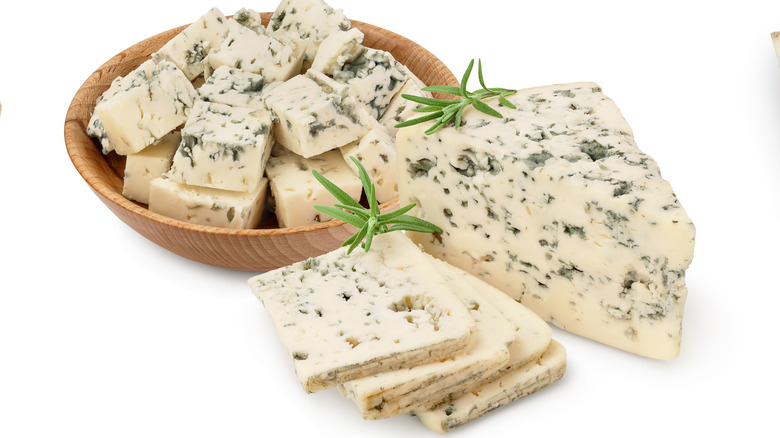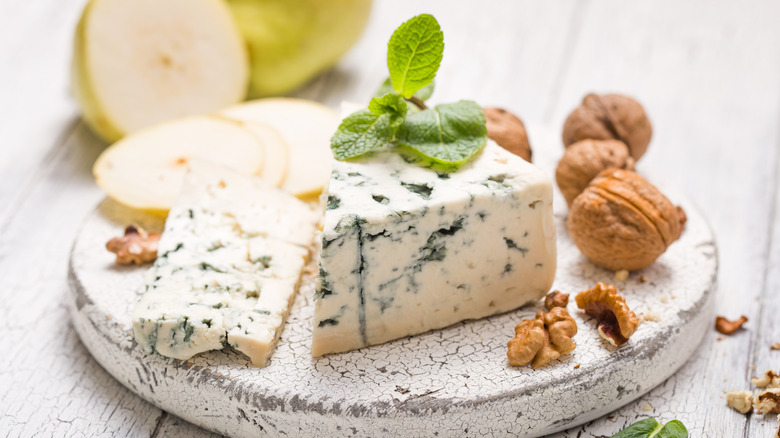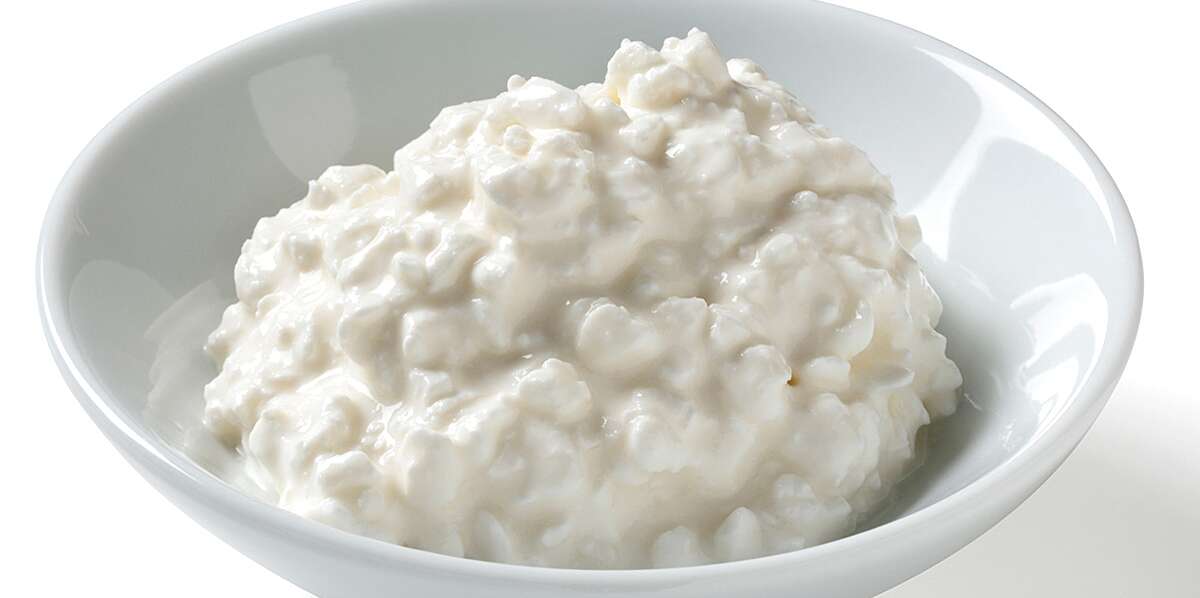Can Dogs Eat Blue Cheese( Images and Facts)
Can Dogs Eat Blue Cheese? No, they cannot eat blue cheese because the bacteria in blue cheese can be harmful to them. Pet owners and especially dogs and cats owner do not recommend it.

Dogs are omnivores and are able to eat a wide variety of food. This includes some types of cheese, which is also a dairy product. However, because dogs have sensitive stomachs and cannot digest lactose well, it is best to avoid giving them blue cheese.
So, blue cheese is not recommended for dogs to eat. The mold in blue cheese produces a toxin that can harm your dog’s health when ingested.
What is Blue Cheese
Blue cheese is a type of cheese that has a blue-grayish or greenish color, which comes from the Penicillium mold.
Blue cheese is made with cow’s milk it is usually made from cow, sheep, or goat milk. The milk may be pasteurized or unpasteurized, and the curds are usually pressed into long, thin shapes. The mold Penicillium causes the blue-green coloration that gives blue cheese its distinctive appearance.

Blue cheese has a sharp, salty flavor. It is typically crumbly. Blue cheese is a cheese that can be found in many forms and varieties. There are blue cheeses that are soft, blue-veined, or have rinds, which have been soaked in brine or soaked in wine or beer.
Can dogs eat cottage cheese?
Yes, dogs can eat cottage cheese. Cottage cheese is a type of soft cheese that is made by coagulating the milk of cows or goats with rennet, a complex protein found in the stomach and small intestine of young animals.
The reason why dogs can eat cottage cheese is that they are lactose intolerant. Cottage cheese contains a lot of protein and calcium, which are key nutrients that dogs need to stay healthy.
Cottage cheese is a type of dairy product that can be safely eaten by dogs. However, it should be noted that the nutritional value of cottage cheese may not be as high as other types of dog food.
Can dogs eat cream cheese?
Cream cheese is a dairy product that dogs can eat in moderation. It is full of nutrients and protein, which are good for your dog’s health. Dogs are not lactose intolerant, so they can consume it.
But cream cheese will not be good for their health. Cream cheese has a high-fat content that should be avoided by dogs.
Some dogs may have an allergic reaction to the cream cheese, so it’s best to check with your pet before serving them any type of dairy product.
Why Is Blue Cheese Bad For Dogs?
Blue cheese is not good for dogs because it contains a chemical called benzopyrene that is toxic to the canine body.
Benzopyrene is a toxin that can cause cancer in dogs. A dog’s liver cannot detoxify this substance as humans can, so it builds up in their bodies over time.
Blue cheese also contains a chemical called propionic acid which can cause kidney failure in dogs. Dogs that have eaten blue cheese have been known to suffer from vomiting, diarrhea, and even death.
Which cheeses are unsafe for dogs?
Some people think that cheese is a good food for dogs because it contains calcium and protein, but this is not true as some cheeses contain too much lactose which can cause allergic reactions in dogs.
There are many types of cheeses that are not safe for dogs to eat. These include

- Blue cheese
- Roquefort cheese
- Brie cheese
- Camembert cheese
- Cheddar cheese
- Muenster cheese
Can Dogs Eat Blue Cheese Rind
The answer to this question is no. Dogs cannot eat blue cheese rind because the chemical compounds in the cheese are toxic to their digestive system.
The reason why dogs cannot eat blue cheese rind is that it contains a chemical called propionic acid which is toxic to their digestive system. This compound can cause stomach upset, liver damage, and even death in high doses.
Can Dogs Eat Blue Cheese Dressing
No, dogs should not eat blue cheese dressing. This is because blue cheese has a high concentration of bacteria that could be harmful to your pet. Blue cheese dressing because it contains a high level of salt and may cause some gastrointestinal issues in dogs such as vomiting, and diarrhea.
Can Blue Cheese Kill Dogs
The answer is yes, but only if the dog eats a lot of blue cheese or has an underlying health condition that makes them more susceptible to the effects of blue cheese.
Centers for Disease Control and Prevention (CDC) describe If a dog eats a large amount of cheese that contains more than 100 parts per million of Brilliant Blue FCF, it can lead to kidney failure.
Related FAQ
How Much Cheese is good for Dogs to Eat?
The amount of cheese that is safe for your dog depends on its age and size. Dogs under one year old should only have small amounts once or twice a week. While older dogs should have more than twice a bite per day,
if your dog is under 10 pounds, it can eat up to 2 bits a day; and if they weigh 10 pounds or more, it should only eat 1 bite per day.
Nutritional Value of Blue Cheese
Blue cheese has a high content of fat and protein, which makes it a very nutritious food. Blue Cheese contains 100 calories, 6 grams of protein, and 8 grams of fats.
It also contains several vitamins and minerals, including calcium, potassium, phosphorus, vitamin A, and vitamin B12.
Can All Dogs Eat Cheese?
Do all dogs can eat cheese or not? Coren’s research shows that only certain breeds can eat cheese who digest cheese and most other dogs cannot.
Can dogs eat blue Stilton cheese?
The answer is no, dogs can not eat blue Stilton cheese. Blue Stilton is a type of blue cheese made from cow’s milk and it has a strong flavor. The reason why dogs can’t eat blue Stilton is that they have an aversion to the smell of mold.
For example, what kind of cheese is blue Stilton? It’s a difficult question to answer because it could be blue gorgonzola or blue brie. There are some other factors that will affect whether or not dogs can eat blue Stilton cheese such as the age of the cheese and whether it has been washed in water or milk.
Is Gorgonzola good for dogs?
Gorgonzola is a type of blue cheese. It has a sharp, tangy flavor and a mild smell. Gorgonzola is also known as “The King of Blue Cheese.”
The answer to the question, “Is Gorgonzola good for dogs?” is no. It can cause an upset stomach for your dog if you give them too much of it. There are many other kinds of cheese that are safe for dogs to eat and that won’t give them any problems.


